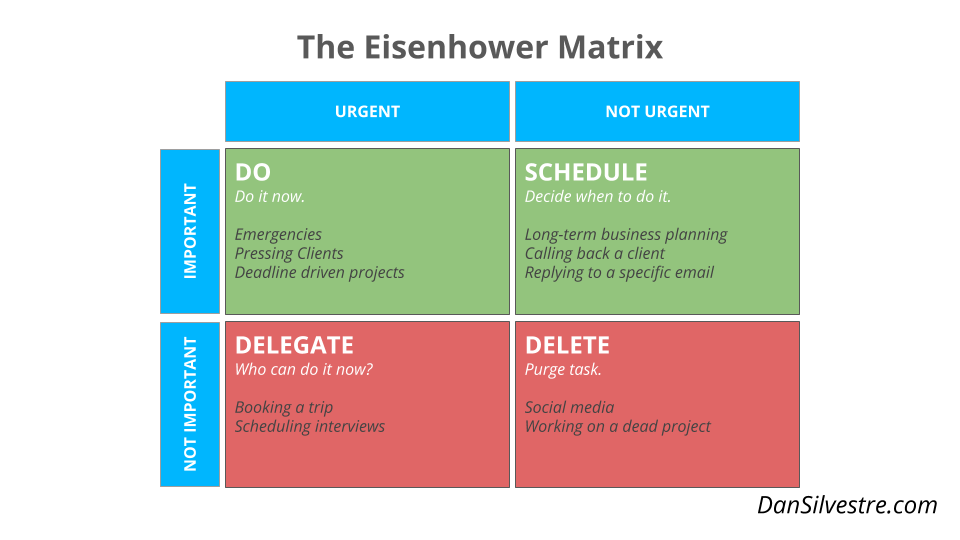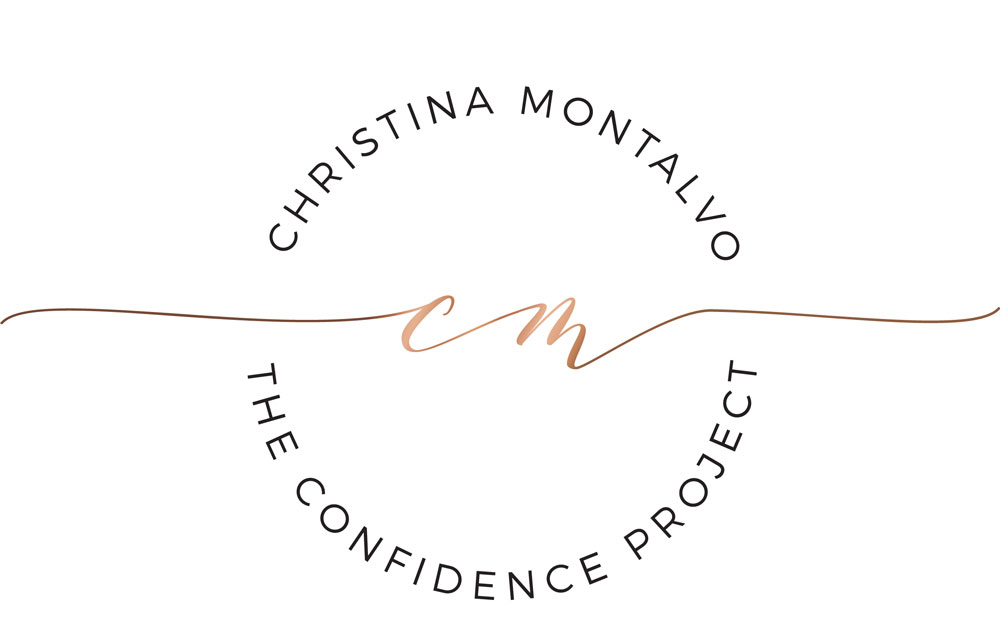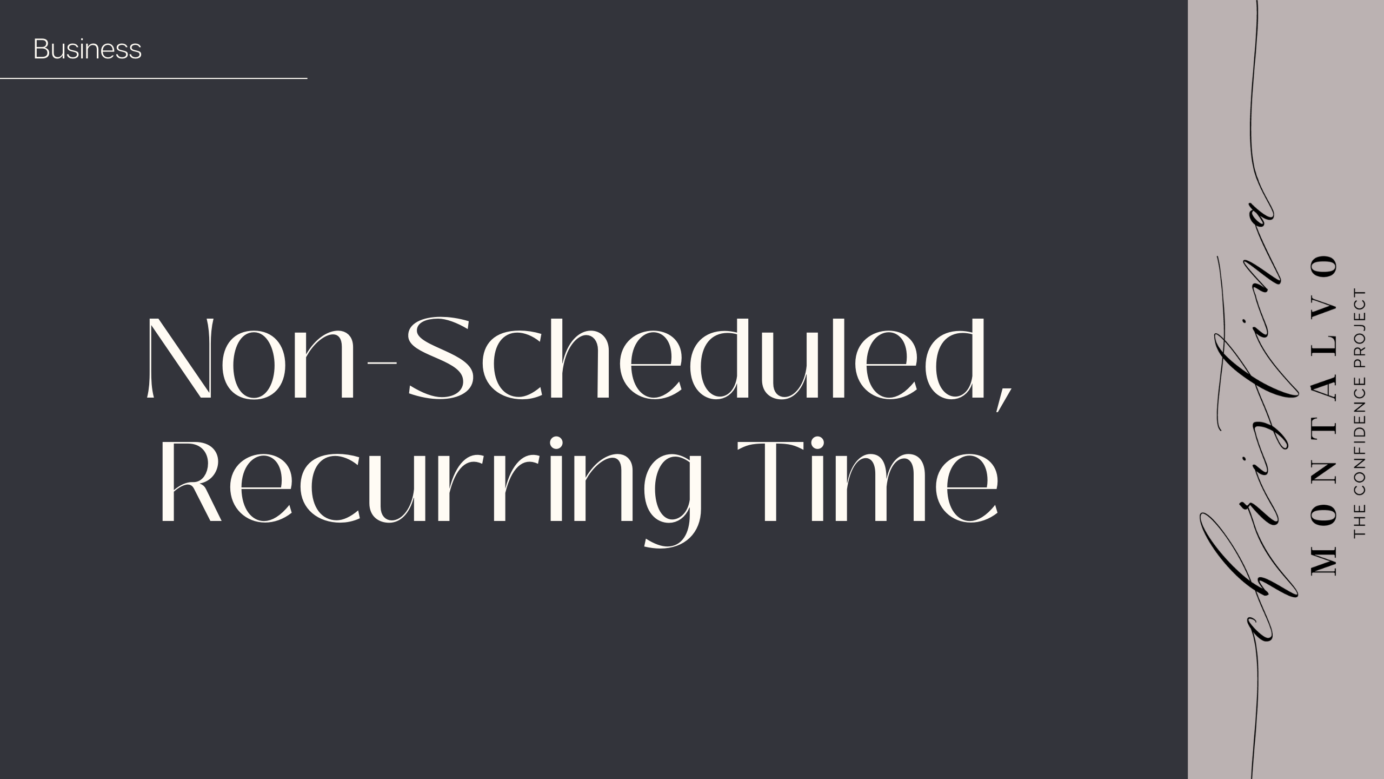Welcome to hell on earth where your to-do list goes to die.
Non-scheduled, recurring time.
Let me (potentially) introduce you to the Eisenhower Matrix.

So many of us live our lives inside quadrant 1: everything is an emergency.
If your schedule is filled with clients, I totally understand loathing all things schedule-related as a way to rebel against the “constantly on a schedule” life that happens to all session-focused business owners.
Side bar: if you do in fact run a session-focused business, seriously consider restructuring the frequency of those sessions. We talked about this inside of the “scheduled recurring time” email. Burnout will absolutely ensue as your client roster grows and you are not managing your energy appropriately. This is a reminder to seriously consider cutting back on scheduled, recurring time specifically as it relates to client sessions and client work & finding ways to replace yourself.
The magic, however, even if your rebel-heart doesn’t want to admit it, is hiding in the power of quadrant 2: scheduling damn near everything.
Here’s what I want you to get clear on:
→ when are you posting on social media this week? Next week?
→ When will you work on your emails for your list?
→ Do you have a podcast? When do you record?
→ When are you working out this week? Next week?
→ If applicable, when’s your next date day/date night?
→ When are you doing laundry?
→ Do you have a team? When are you touching base with them?
To the untrained eye, this sounds MILITANT.
But it is your sneaky saving grace.
Yes, I even schedule my down-time. Meaning, there are blocks of time in my calendar that say: “DO NOTHING’ or ”DO WHATEVER YOU WANT.”
Yep. Yes. I am not kidding.
A few notes:
→ Structured fluidity is key.
If I was “supposed to record a podcast” and my grandma invites me over- forget the podcast, I’m going to Namma’s house! If I’m “supposed to get a lift in” but the sun is shining and all I want to do is go for a walk- screw the lift, I’m going for a walk. If Michelle Obama calls me when I’m sitting down to write these emails, I’m answering the phone. (Still waiting for this to happen, tbh.)
Discernment is key. A deep connection with your values is key.
→ Gather your own data.
Each week, I sit down with last week’s planner pages (pen and paper, baby!) and see “how I did.” I make notes to myself throughout the week to get a better idea of “what I wanted to happen” and weigh it against “what actually happened”- and most importantly, WHY?
These are the notes I leave myself and then reflect on at the end of the week. I use this data to then help me “design” the next week/month, etc.
Key word = design.
For example, if you keep writing in your planner that you’re going to lift at noon, and never do- why? Continuing to schedule this in at that time for weeks on end makes zero sense. You continue to frustrate yourself by not sticking to it, and you’re making zero adjustments based on your own personal feedback from your life.
A better idea would be to take a note at the end of each day next to “workout @ noon” and jot down WHY it didn’t happen- zero judgement.
Is it because you were too hungry?
Too low energy?
Overwhelmed?
Need that hour to finish something else?
“Didn’t feel like it” isn’t helpful. The question is WHY.
Look at how you wanted to spend your time vs how you actually spent your time and adjust accordingly.
Maybe you need lunch at noon vs a workout, ya know?
________________
If we don’t schedule these things, life goes like this:
“I’m working with clients today from 12-5pm. I want to be in bed by 10pm. That means I have 5 hours to do EVERYTHING ELSE.”
You get to 5pm, and you’re tired. You’re hungry. You’re buzzing a bit from seeing clients all afternoon.
Your to-do list is incredibly long.
You have decision fatigue and don’t know where to start.
You make dinner, sit on the couch either waiting for motivation to strike or decide “today is not the day.”
You repeat this process until you’ve got one of those high-energy, productive days and you wonder why you’re not “this productive every day”.
Said day of high-productivity is rewarding, but draining, so the next day you’re too tired to be just as productive. Lather rinse repeat until THE. DAY. WE. DIE.
The problem is that we under-estimate the time.
We over-estimate our energy.
We don’t actually put things into our calendar and we rely too heavily on motivation.
We don’t account for transition time or transition fatigue.
You wonder how you’re able to show up SO WELL for your clients but can’t manage to do anything for your self.
The magic is in the sneaky saving grace: scheduling it.
But the magic doesn’t stop there.
Schedule LESS than what you’re immediately inclined to scheduled for any given day.
If you’re like me, your first instinct sounded like this:
“Ok great, schedule! So, tomorrow, I will wake up at 6am and go for a walk. I’ll reply to emails and check social from 7-8am and eat 8-9am. I have clients from 9-12. I’ll grab a quick snack from 12-12:15 and lift from 12:15-1pm. I have another client at 1:15. Plenty of time. I’ll do the laundry and wash the dishes at 2:30. I’ll batch-record 17 reels back to back from 2:30-3:30 pm. I’ll write out captions from 3:30-4:30pm. At 4:30pm, I’ll go to the grocery store. I’ll start cooking dinner at 6pm. I’ll shower at 8pm and be in bed by 9pm and holy shit! At this rate, I’ll have world domination by next month!”
LOL to all of this because this was me in 2013.
It never went down like that. It just left me feeling like a lazy ass hole every day because I couldn’t “hold myself to do the things on my to-do list each day.”
Plan for less in order to actually do more
And, if you’re like me, you need plenty of time to transition.
I cannot go from one task to another without ample transition time UNLESS it’s a similar task. So, I can go from call to call just fine. But I cannot do call, workout, call, laundry, call, cook.
I know this because I assess and observe myself like mentioned with the notes I leave myself in my planner. This then means I do similar tasks all at once as best I can & I intentionally plan my time in that way.
There’s a decent chance of some of the things on your to-do list that should be deleted. Marie Kondo that shit as best you can.
Other things can likely be delegated- yes, even around the house.
——————–
Are you in a heterosexual relationship? Women in heterosexual relationships are doing WAY more than their fair-share of household labor compared to men in heterosexual relationships. It’s been proven time and time again. Literal data exists to prove it. It might be time to have the “distribution of unpaid labor” conversation with your partner, if applicable.
Did you become the designated sock-putter-away-er? Was this mutually agreed upon? Do you enjoy doing it? Or do you do it out of habit? Do you do it just so you don’t have to hear your partner complain that they can’t find their socks? This is obviously just one example, but I can guarantee that you have more than your fair-share of labor on your plate. And no, I don’t care if you’re “not the breadwinner.”
Some thing I’ve never shared before is that on a daily basis, I can be overheard saying in a Transylvanian but kinda Russian accent: “not my problem.” I don’t know why I say it with an accent, but I do, ha!
“Where are my socks?”
Me, sounding like the guy from Despicable Me: “not my problem!”
I wish I were kidding, lol
Knowing what is and isn’t your problem is key.
Not everything is your problem.
I know it feels like it, but not everything is your responsibility.
I’m not here to be a relationship coach, but I will say this:
let your partner step up for themselves AND for you.
Because I’ll tell you what, I never once signed up to be the sole house-manager. I will not be the sole reason things get done, put away, cleaned up, accomplished, done, etc. around the house.
You probably didn’t sign up for it either.
Have the conversation with your partner as often as you need to.
Consider quarterly or bi-annual relationship meetings to assess and renegotiate the household roles. And, remember: it doesn’t matter if you’re not the breadwinner. Bringing in “more money” doesn’t make you “more worthy” of not needing to do every. single. thing. at home. This is not the 1950s. Don’t do that to yourself. You have a business to run.
I digress. For now 😉
_________________________
Things to schedule:
→ when will you be checking your emails?
→ when will you be logging in to check on your clients?
→ when are you available for client calls/sessions/etc?
→ when are you paying your bills?
→ when are you looking at your accounting?
→ when’s your down time/do nothing time?
→ check social?
→ create for social/post on social?
→ write out captions?
→ create blog posts/podcasts/YT?
________________
My personal rules:
→ no email on my phone. I check 1-2x per day. It’s literally in my calendar when I will check it.
→ If I can, I batch. I’m almost always working ahead. If I can schedule it, I’m scheduling at least 2 of whatever it is. If I can save it, I’m saving 2 of whatever it is. Think: IG drafts.
→ do my future self favors however I can. Random example, but most recently, I realized I’m always making an extra trip back down stairs to get another garbage bag for the upstairs bathroom- sounds silly, but putting extra bags in the upstairs bathroom saves me the “ughhhhhhhh” of having to take that extra trip & undoubtedly getting side tracked 9 times then standing in the kitchen wondering “wait, why am I in here?”
Our free-time goes to die when we don’t live in quadrant 2, because then everything becomes a quadrant 1.
To get your time back, come up with a rock solid, structured yet fluid, quadrant 2.
I repeat: structured yet fluid WITH time to do nothing or whatever you damn well please.


